First World War

A war which was to see our youngest and fittest men enlisted into the Armed Forces, to face the appalling conditions and dangers of four years of trench warfare.
Coming home
The spirit of comradery
Once the wounded had initially recovered, they could be fitted with artificial limbs to try and restore as much mobility and normality as possible. The prosthetics of the day were mostly wooden with leather strapping.
Specialist hospitals were set up for the war limbless at Roehampton near London, at Erskine in Scotland and in schools and other public buildings all over the country. The artificial limb industry in 1914 consisted only of a few small family businesses with the limbs supplied being heavy and cumbersome. New workshops had to be established and a large number of workers trained in order to meet the new demand.
During this period, as limbless men came together for their treatments and fittings, there developed a spirit of kinship amongst them, arising from their common disabilities and shared experiences. The crutch, the walking stick, the empty sleeve, served as an introduction to friends who had met with similar misfortunes in battle. The spirit of comradeship which had existed in the trenches was kept alive amongst them.
It was during this time that limbless men gathered to discuss their problems and the possibility of some action to improve their conditions.
First World War members
Bedside visits to the wounded
William Henry Towers served as a Gunner with the Royal Field Artillery on the Western Front. He was injured by German shellfire whilst leading horses carrying ammunition up to the front line. After losing his leg in the war he soon started making visits to fellow amputees recovering in hospital.
A land not fit for heroes
Wilfred Whitfield served with the Yorkshire Regiment and his life was changed forever when he lost his arm during a firefight in the Battle of the Somme. Incredibly, he escaped with his life but as an amputee he lost his old job as an engineering draughtsman. He was one of three disabled war veterans sacked on the same day. His manager echoed widespread sentiments of the day: "You ex-servicemen are a nuisance. You are behind in your experience, we have to economise and there are better men for less money."
Wilf decided to take action and became the founder and chairman of the Teesside branch of Blesma. He raised funds and ran campaigns, writing to newspapers and politicians, to increase awareness of the plight of disabled veterans.
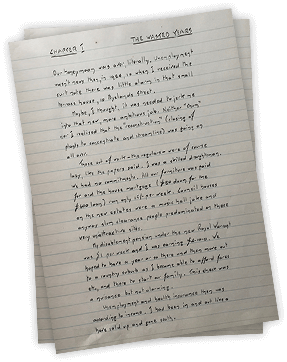
Lesma is formed
During the 1920s limbless men gathered together to discuss their problems and to support each other. A group of such men in the Glasgow area banded together to form the first branch of the Limbless Ex-Service Men's Association.
National status
Blesma gets national charitable status
Branches of the Limbless Ex-Service Men's Association come together to gain national charitable status, becoming the 'British Limbless Ex-Service Men's Association', or 'BLESMA' for short.
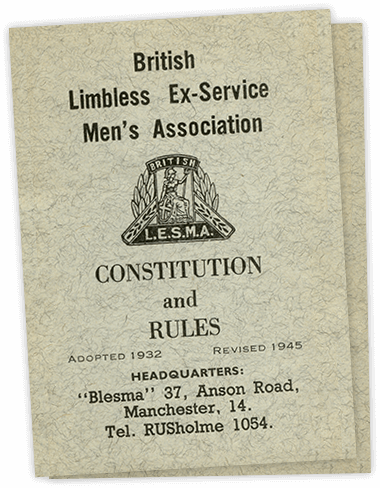
Second World War
Coming just two decades after the last great global conflict, the Second World War was the most widespread and deadliest war in modern history. During six years of conflict across the world, 475,000 British servicemen were injured, including 12,000 who lost limbs.
Having achieved national status work began to elevate the plight of the general body of limbless ex-servicemen and women led by prominent officers and Members at the time.
The outbreak of war brought many fresh problems to organisations such as Blesma. With added responsibilities on individuals such as Air Raid Precautions (ARP) duties and the blackouts, manpower shortages at least provided employment opportunities for the limbless. Many other organisations ceased active operations for the duration of the war, but not Blesma!
A special appeal came from the Officers of the Association to keep branches going. Blesma were determined that the new generation of war limbless would not suffer neglect as their predecessors had following the First World War. As they saw it, it was up to Blesma to build a strong and influential organisation that the Government could not ignore as the official body representing all war limbless.
Second World War members
John Booth
"I joined the Royal Artillery when I was 21 and was sent off to Singapore. After 10 months I was taken as P.O.W by the Japanese where I was sent off to work on the railways in Burma. We all became ill because we were denied shelter and food. The worst thing was that the tiniest bite or scratch would get infected. At some point I grazed my leg, both went septic - and that turned into something called 'tropical ulcers'. It's the most painful thing you can possibly imagine. It eats your leg away. One of the doctors was taking legs away like ninepins. There was no anaesthetic, no medical staff at all. Four people held me down and they chopped them off. Both legs went. Most lads died after the amputations, but I survived. I joined the association in 1946, so they've been a part of my life most of my life."
Gwen Marsden MBE
"I joined the Auxiliary Territorial Service in 1943. I wanted to be a driver but I ended up working as a radar operator. We only wore cotton garments, we didn't have protective clothing, and the radiation from the equipment caused a cancerous growth. I'd had a fall on some Tarmac, which hadn't seemed terribly serious, but the injury to my thigh bone became cancerous. The bone had splintered and there was a huge growth like a cauliflower. My parents were told that, unless they amputated, I had six weeks to live. I was told I'd be looked after and get a prosthesis from Roehampton, but it took two years to get one. I wrote to my MP, but Blesma came to the rescue."
Ken Gash
"I was co-driving my tank when we became immobilised in full view of the enemy. We were taking heavy fire. My CO ordered me to get out and join a friendly Infantry unit in a nearby ditch."
Ken heroically took a machine gun from his broken-down tank while under heavy German fire. He then spent a day fighting alongside an American unit and shuttling between a nearby ditch and the armoured vehicle to get more ammunition, before finally being hit by a mortar. His actions led to him becoming one of only a few Brits to win the American Silver Star.
The first Blesma magazine
This year saw the publication of the Association's first own Journal.
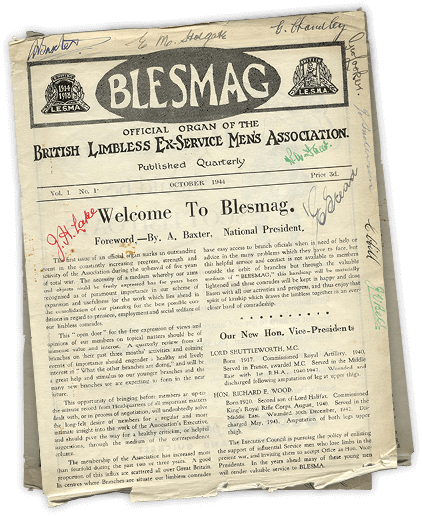
Royal patronage
HRH Princess Alice The Duchess of Gloucester graciously consented to become the Blesma Royal Patron.
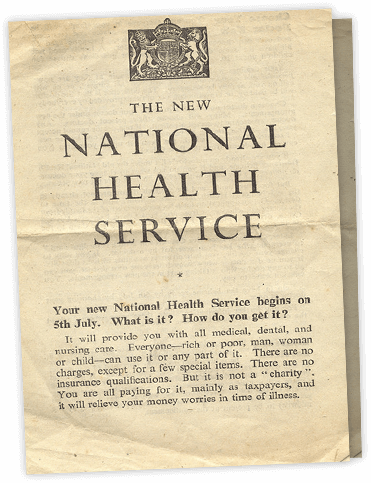
Launch of the National Health Service in Manchester by Health Secretary Aneurin Bevan. For the first time, hospitals, doctors, nurses, pharmacists, opticians and dentists were brought together under one umbrella organisation to provide services that were free for all at the point of delivery.
Care homes for the wounded
Blackpool Home purchased. Over the decades the home proudly cared for 100s of injured veterans and widows providing them with housing and support in specialist adapted accommodation.
Active representation
Blesma has always campaigned on behalf of its Members, this period saw very active representation by Blesma to the government and their persistent refusal to increase disability pensions paid for limb loss.
Portsmouth home opens
Designed to cater for the Membership in the South, the first resident of the Portsmouth Home moved in on 16th September after three years of extensive renovations. It was officially opened by Blesma's Patron, HRH The Duchess of Gloucester on 30th October.
Making a stand
The Blesma All-Party Committee of MPs continued to press for an increase to war pensions for the war limbless and in 1955 it was decided once more that Blesma should take to the streets. During the demonstration seven members proceeded to 10 Downing Street to present the proposition for immediate steps to increase the rates of pensions for all disabled pensioners.
Limbless veteran Jim Toft delivers Blesma's message to number 10 demanding improved disabled war pensions.
Reach for the sky
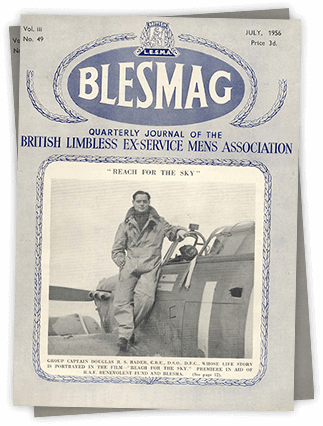
The life story of Group Captain Douglas Bader was produced as a feature length film and presented on 5th July, the proceeds of the night being shared by Blesma and the RAF Benevolent Fund. "Reach for the Sky" starring Kenneth Moore was, and remains still, an inspiration and living example to all those who have lost limbs.
Bader lost both his legs in a flying accident in 1931 and was told we would never fly again. He was incredibly, re-commissioned in 1939 and went on to become one of the most revered pilots of the Second World War, scoring 22 aerial victories making him 'the fifth most deadly fighter pilot in the RAF'.
Motability
Blesma Member Mr H. F. Ball given the first Mini Minor to come off the production line. Mr Ball was injured on the first day of the Battle of the Somme in 1916. This was the forerunner for the modern day Motability scheme which helps disabled people remain independent and mobile.
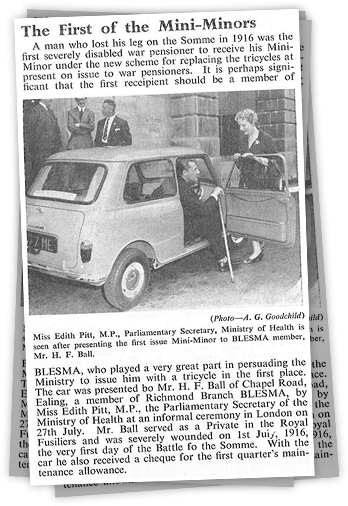
A sporting chance
Blesma national sports day
The first Blesma National Sports Day was held at the National Spinal Injuries Centre, Stoke Mandeville with the Richmond Branch taking the top spot, this event can be seen as a forerunner for the modern Paralympic Games. The revolutionary approach to rehabilitation shown at the games has since then grown to redefine the perception of disability.
Who said disabled
Third Blesma home opens
Third Blesma Home Opens on Saturday, 24th August. The sun shone brightly as nearly one thousand people gathered in Crieff, Scotland for the opening of the third Blesma home by HRH the Duchess of Gloucester. The land for the home was donated by Earl and Lady Ancaster – the Earl was the National President, and a Member himself.
War heroes compete in their own golfing championship
Dramatic growth
The Association had grown dramatically over the twenty years from 24 to 120 branches. Three homes existed where previous there were none and Blesma was accepted nationally and internationally as the body to represent and speak for our limbless veterans.
- Home 1
- Home 2
- Home 3
- Home 4
- Home 5
- Home 6
- Home 7
- Home 8
- Home 9
- Home 10
- Home 11
- Home 12
- Home 13
- Home 14
- Home 15
- Home 16
- Home 17
- Home 18
- Home 19
- Home 20
- Home 21
- Home 22
- Home 23
- Home 24
- Home 25
- Home 26
- Home 27
- Home 28
- Home 29
- Home 30
- Home 31
- Home 32
- Home 33
- Home 34
- Home 35
- Home 36
- Home 37
- Home 38
- Home 39
- Home 40
- Home 41
- Home 42
- Home 43
- Home 44
- Home 45
- Home 46
- Home 47
- Home 48
- Home 49
- Home 50
- Home 51
- Home 52
- Home 53
- Home 54
- Home 55
- Home 56
- Home 57
- Home 58
- Home 59
- Home 60
- Home 61
- Home 62
- Home 63
- Home 64
- Home 65
- Home 66
- Home 67
- Home 68
- Home 69
- Home 70
- Home 71
- Home 72
- Home 73
- Home 74
- Home 75
- Home 76
- Home 77
- Home 78
- Home 79
- Home 80
- Home 81
- Home 82
- Home 83
- Home 84
- Home 85
- Home 86
- Home 87
- Home 88
- Home 89
- Home 90
- Home 91
- Home 92
- Home 93
- Home 94
- Home 95
- Home 96
- Home 97
- Home 98
- Home 99
- Home 100
- Home 101
- Home 102
- Home 103
- Home 104
- Home 105
- Home 106
- Home 107
- Home 108
- Home 109
- Home 110
- Home 111
- Home 112
- Home 113
Northern Ireland
British troops deployed to Northern Ireland in response to The Troubles.
Northern Ireland members
Darren Swift
"It was a typically grey, overcast Belfast day. I was working with the Army Dog Unit and was feeding my dog when two members of the IRA threw a coffee jar bomb at me. It instantly killed my colleague and good mate, Geordie. I was blown to the floor. There was smoke and cordite, and I felt shocked – like I'd been cuffed around the head. But, weirdly, I wasn't in any pain. I looked down at myself. My left leg had gone completely – it was found 20 metres away, over a wall, still smoking in my boot! My right leg was hanging off, as were several of my fingers. I remember being fascinated that they weren't spouting blood."
Paul Burns
Eighteen of his friends and colleagues were killed in the Warrenpoint Blast — the biggest single loss of life during The Troubles. Paul barely survived. His body was broken. Both his legs were smashed and burnt to the bone. His right leg was barely spared but his left leg was amputated below the knee. Those who saw him wondered if it might not be kinder to let him die.
He always went for a challenge whether it be on Blesma ski biking in the Alps, skippering a 65 foot yacht with an all amputee Blesma crew, passing on his skills as a sailing instructor, horse riding, canoeing and much else besides.
Peter Spencer
Member Peter Nelson Spencer, an ex RAF pilot who, after a crash, had one arm amputated and lost the use of the other through paralysis, painted Blesma's armorial bearings using his mouth. He paints by holding the brush between his teeth. He also made history by becoming the first Member with no use of arm's to successfully pass his driving test.
Improved war widow's pensions long campaigned for by Blesma
After a long campaign, Blesma helped to bring about change to the War Widows' Pensions. The bar to those widows whose marriage had taken place after their husbands left the services following WW1 and who died before 3rd September 1939 was removed.
Nora Peacock
First female member on executive council
At the conference held in Scarborough Miss Nora Peacock was elected onto the Executive Council, the first limbless ex-service woman to do so. Nora served as a Leading WREN in Egypt during the Second World War, losing her right leg above the knee.
1981 - Cross-channel yacht race
Fifteen members saw nothing but water as they competed in a Cross Channel yacht race. Sailing into a strong headwind and beating in heavy seas they had to 'tack' all the way to France but after 20 hours at sea they were successful. Facing better weather for the race back to England, but still combating winds gusting to Force Seven. At the conclusion of the race, Hugh Hammersley organiser, paid tribute to his fellow Blesma members for the 'Service and Fortitude', including Philomina Tibbenham (pictured) who lost an eye manning an anti-aircraft gun during WWII.
1996 - Time and tide
In 1996 Blesma Members served aboard the 'Time and Tide' as part of the first disabled crewed sailing yacht in the BT Global Challenge. The BT Global Challenge was an around-the-world yacht race like no other consisting of a grueling 30,000-mile adventure. The race was unique in that it took the western route around the world against prevailing winds and currents - often referred to as the 'wrong way' route. The event claimed the motto "The World's Toughest Yacht Race" and was the ultimate sailing challenge for amateur sailors.
Blesma golden jubilee
500 limbless Members and their partners advanced down Whitehall to the Cenotaph for the laying of wreaths following a service in Westminster Abbey. A solid phalanx stretched across Whitehall in the sunshine, a totally inspiring sight. It was during this ceremony guest Margaret Thatcher broke away to declare war with Argentina.
Falklands War
Britain lost 255 men, six ships and 34 aircraft during the conflict to take back the British territory that had been invaded by the Argentine military under the Junta Generals.
Further success for war widows
Government decision to introduce a special weekly payment for pre-1973 War Widows following campaigning from Blesma and other veterans charities.
New national president
Duke of Westminster becomes National President of Blesma in the charity's Diamond Jubilee Year.
The first welfare officer
Rosemary Cornwall was installed as the first area Welfare Officer. This was a move by Blesma to introduce welfare support into the home environment. The welfare officer would ensure veterans were in receipt all of their correct entitlements. As of 2017, Blesma had nine Support Officers based across the UK, and one based in the Chadwell Heath office who covers prosthetics.
Paralympic games,
Atlanta, USA
Three Blesma Members part of Team GB with one, Tony Downs, winning a gold medal for sailing - the first Blesma Member to do so.
Winter Olympic games,
Nagano, Japan
The final leg of the Olympic Torch Journey and the lighting of the Olympic Flame were performed by Blesma Member Chris Moon.
Keeping active
Sport and activities have always been an important part of Member's rehabilitation and well-being.
War's in Afghanistan and Iraq
This was the first time in decades that the British military had been involved in two major conflicts simultaneously.
Operations HERRICK (Afghanistan) and TELIC (Iraq) marked the beginning of a new generation of military amputees – as from wars before, young fit people with their lives ahead of them, often with families to support. Overall Blesma received 339 new Members, including 97 double and 19 triple amputees, from both conflicts.
Afghanistan and Iraq members
Mark Ormrod
Mark was just under four months into his first tour when on Christmas Eve, he stepped on an IED landmine which blew up in front of him. He ended up losing both of his legs above the knee and his right arm in the blast.
"Within a year I'd learned to walk using prosthetics and then found myself sit-skiing in Colorado on a Blesma rehabilitation break. It was awesome. Just great to get out of hospital and be with a group of people in the same circumstances; guys who'd lost arms and legs in action just like me. It made me feel normal again."
Major Peter Norton
The bomb disposal officer was investigating an IED blast that had killed four US soldiers. Despite being informed of a possible secondary IED Peter decided to conduct a 'one-man-risk' examination of the area.
Whilst conducting the examination he trod on a concealed IED. He suffered the loss of his left leg and part of his arm. Despite his injuries he managed to remain conscious enough to guide his team away from further bombs before allowing them to administer him with first aid. A further IED was discovered later 10 yards away.
He is credited with saving the lives of at least seven soldiers and was later awarded the George Cross.
Constitution amended
A major rewrite
A major rewrite of the Blesma Constitution to include Membership for those who lost the use of limbs whilst in service or as a result of service.
Opening of the national memorial arboretum
The National Memorial Arboretum in Staffordshire opens, with a dedication ceremony held on 10th June at the Blesma garden.
Corporal Colin Hamilton
Blesma Member Corporal Colin Hamilton becomes the first British above-knee amputee to go back on operations as he deployed to Iraq with the Black Watch to Iraq.
Fairer pensions
Blesma was a key advisor to the Government review on war pensions to be replaced by the Armed Forces Compensation Scheme. This helped make war pensions fairer and more appropriate to the injuries received.
2011 - North Pole
4 wounded soldiers established a world record by becoming the first disabled team in history to walk unsupported to the Geographic North Pole. They were joined for part of their journey by HRH Prince Harry.
2014 - Channel Swimmers
The team completed the crossing just over 12 hours raising around £4,000 for Blesma and setting the record for the first all-amputee team to cross the Channel. They adhered to the Official Channel Swimming Association (CSA) rules which include not wearing wetsuits in water temperatures that average at 18°C for September. They did not wear their prosthetic legs out of choice.
2005 - Atlantice Race Challenge
The Atlantic Race Challenge took place in 2005 with a complement of 15 crew on board an unadapted Farr 65 yacht, called 'Spirit of Juno'. It must be appreciated from the start that whilst the crew had completed a number of training events and races the majority, with the exception of those that had taken part in the Fastnet Race 2001, were very inexperienced in ocean sailing.
2016 - Row2Recovery
Row2Recovery become the first all amputee team to row the Atlantic. The team raised over £26,000.
2013 - Race2Recovery
Race2Recovery become the first and only motorsport team with combat injured Members to twice enter and complete the Dakar Rally. This year's event covered 8,500km in South America.
2017 - AGS
Adaptive Grand Slam Team summit Mount Aconcagua, the highest mountain in South America.
The Murrison report
A better deal for military amputees
Blesma contributed significantly to MP Dr Andrew Murrison's report titled 'A better deal for military amputees' in which he outlined twelve recommendations to improve the care of military amputees, sparked by the new generation coming back from Iraq and Afghanistan. This led to significant improvements in the provision of prosthetic support to military veterans with attributable amputations.
Paralympic Games,
London, United Kingdom
The London games were the largest Paralympics ever hosted and testament to how far the disability sports movement had grown since the Stoke Mandeville games.
Invictus Games
The inaugural games in London featured more than 400 competitors, both serving personnel and veterans, from 13 nations, including 46 Blesma Members.
Wounded: The legacy of war
Bryan Adams' "Wounded: The Legacy of War" exhibition opens at Somerset House. The powerful exhibition highlights the aftermath of recent conflicts.
The White Report
The report commissioned by Blesma and written by triple amputee Member Jon White, was the most detailed study of how the nation's 160 most complex war wounded men and women are treated. It found failings across the NHS and called for a fresh approach to their care, resulting in a number of improvements made by the NHS.
NHS Veterans Mobility & Hearing Fund
Blesma took a leading role with two new funds totalling £13million over 5 years, launched to support veterans with serious physical injury or hearing loss, providing them with equipment and therapies to improve their wellbeing.
Breakthrough
Direct Skeletal Fixation made available to a small group of limbless veterans on a pilot programme following Blesma campaigning.
Direct Skeletal Fixation (DSF) is a medical procedure where a titanium rod is implanted directly into the residual bone. Part of the rod is exposed through the skin so that an external prosthetic can be attached. This negates the need for a socket. Ill-fitting sockets are one of the biggest issues for amputees.
Following a Blesma campaign, £2M was given to the MoD by HM Treasury to provide opportunities for this surgery in the UK. Previously amputees had travelled to Australia, a few at their own cost.
Changes to Eligibility
Those who lose the use of their limb(s) through a traumatic incident that is not service related are now eligible for the charity's support.
Thanks to Blesma campaigning, NHS England start to routinely provide microprocessor knees for NHS patients who meet the criteria.
Blesma community programme
The pioneering Blesma Community Programme helps train Members to tell their stories and inspire resilience in youth.
The programme also provides an opportunity for Members to gain valuable leadership and public speaking skills and paid employment. The 2017 programme went into schools and prisons, reaching over 8,500 pupils and adults.
WW1 Centenary
Blesma looked back on 100 years since WW1 by creating a commemorative issue magazine, as well as by hosting these poigniant events for members to be involved in
This is not for you
Blesma Members alongside professional performers from the Graee Theatre took part in a moving outdoor theatre piece- This is Not for You
Blesma Families Project
The ground-breaking Blesma Families Project was a unique research initiative that gathered information on how veterans and their families cope with limb loss. The report made recommendations for support and practices which Blesma and other organisations could develop, suggestions for future research, and development of an evidence base that will underpin policy making and service delivery.
Jubilee Sailing Trust
A group of injured veterans and their family members sailed the English Channel, thanks to Blesma and the Jubilee Sailing Trust. Blesma Members along with their families, carers boarded SV Tenacious, a specially adapted fully accessible tall ship and travelled on a week-long voyage from Southampton to Jersey.
Centenary magazine
As the Association looked back on 100 years since its early formation and to commemorate the centenary of WWI we created a commemorative issue magazine. It highlighted the incredible achievements of Blesma and it's Members over the course of the century . Read it here
Outreach Officers
Move to Chelmsford
In 2019 Blesma's central offices moved from their long term home of Frankland Moore House in Chadwell Heath, first occupied by Blesma in 1965, to Chelmsford. The move aimed to make Member visits and interactions more frequent, with a more accessible, and more cost effective, building.
Introduction of Outreach Officers
It was announced in 2019 that the Outreach programme would be made permenant. Originally a pilot programme founded with LIBOR funding, it proved itself a success thanks to the hard work and tenacity of the Outreach Officers who operate in each Blesma Support Officer region. They help grow Blesma's footprint, bring Members together, strengthen the Member to Member connections which are so unique to Blesma and raise awareness of the Associations' vital work.
Hero Arm
Thanks to extensive campaigning from Blesma, Darren Fuller has become the first Military veteran to receive a 'Hero Arm' - the worlds first clinically approved 3D Printed bionic arm.
Blesma Connects is launched
Blesma was proud to launch Blesma Connects, the App is the first of it's kind among Military charities which aims to bring our Members closer to the Association and to each other, providing the latest news, Blesma Support, Activities, and provides a secure chat function.
Screen reader support enabled.
Coronavirus and adapting to life
Coronavirus
Blesma were agile in adapting to life during lockdown. With the vast majority of our staff working from home, our Welfare and Outreach teams were quick to make contact with every one of our Members, ensuring they had all they needed during this difficult time. Activities planned for in person were soon brought online, and tackling isolation was immediately highlighted as a top priority.
Blesma's 90th anniversary
90 Years
2022 marks 90 years since Blesma's formation. Since then we have supported over 62,000 veterans with lifelong support.




